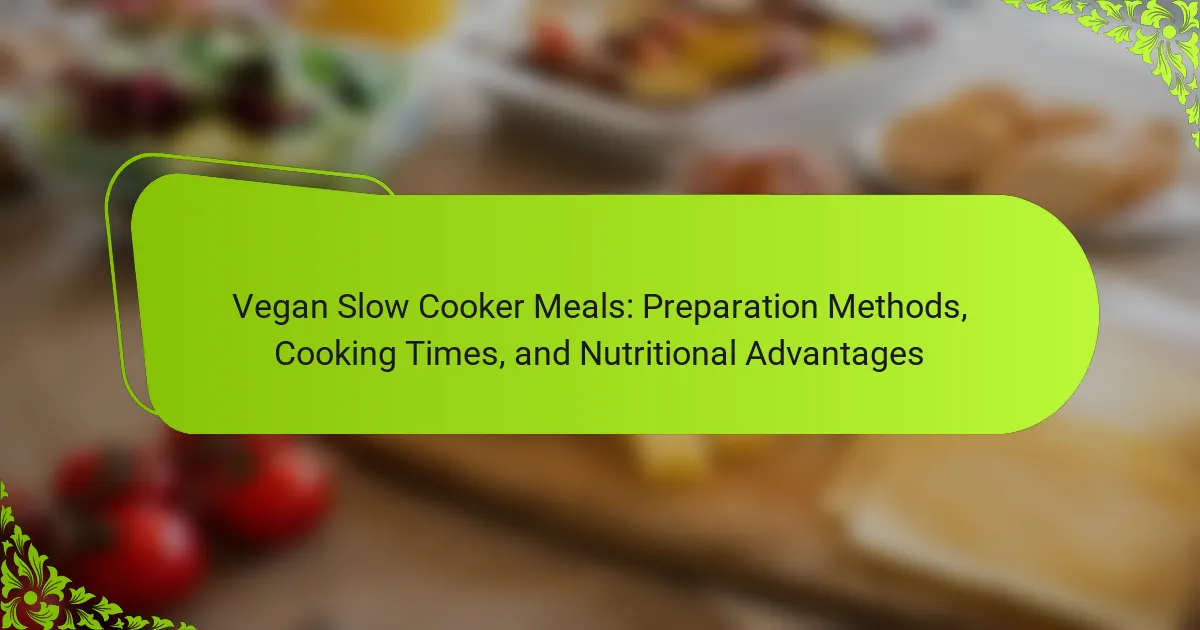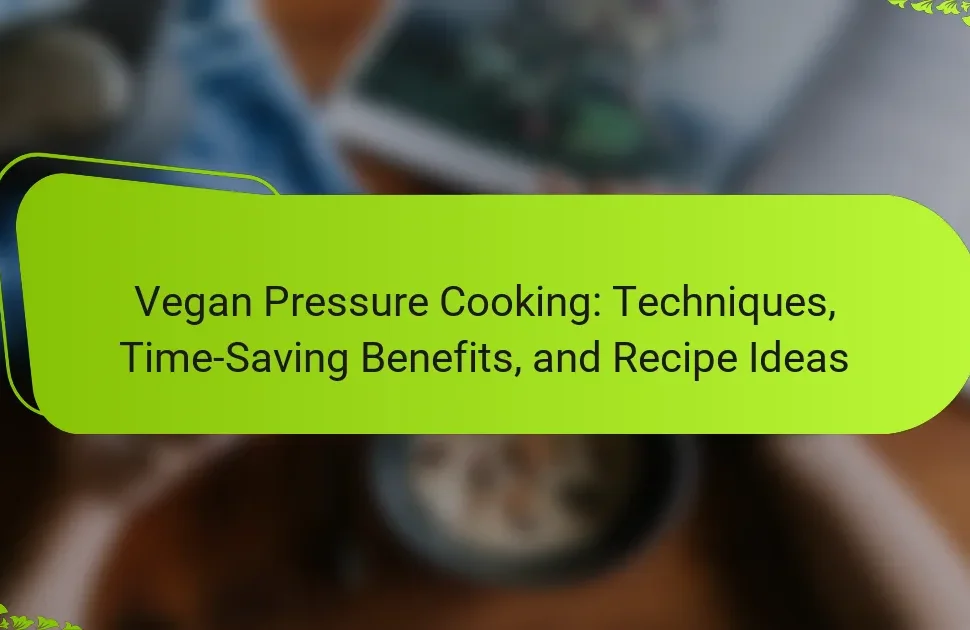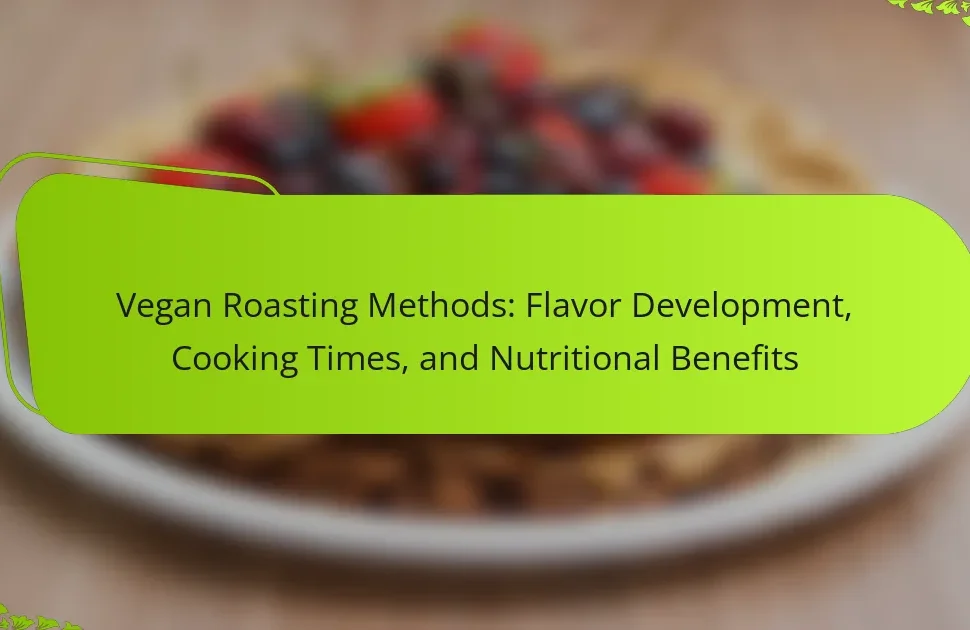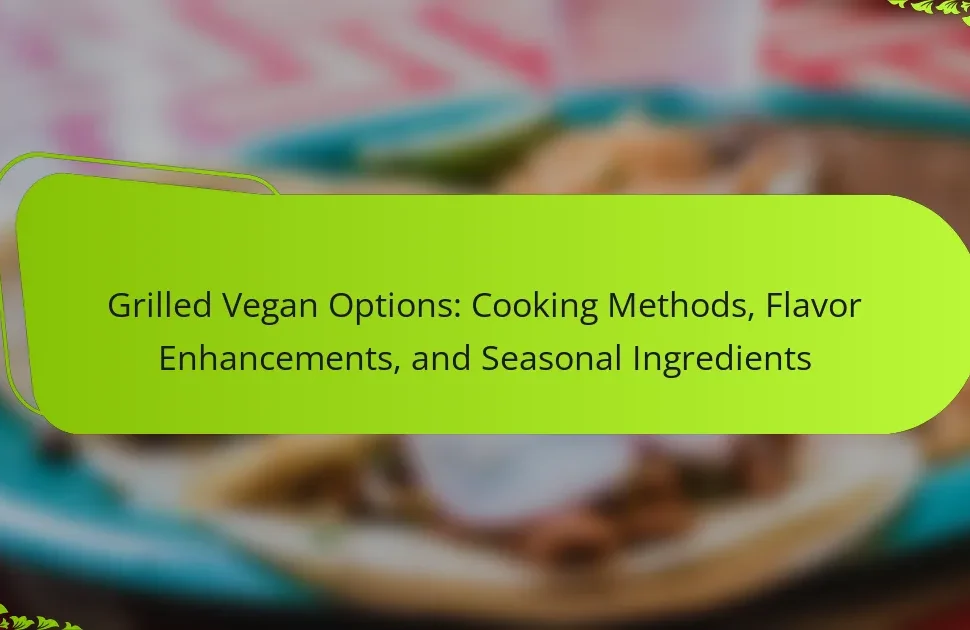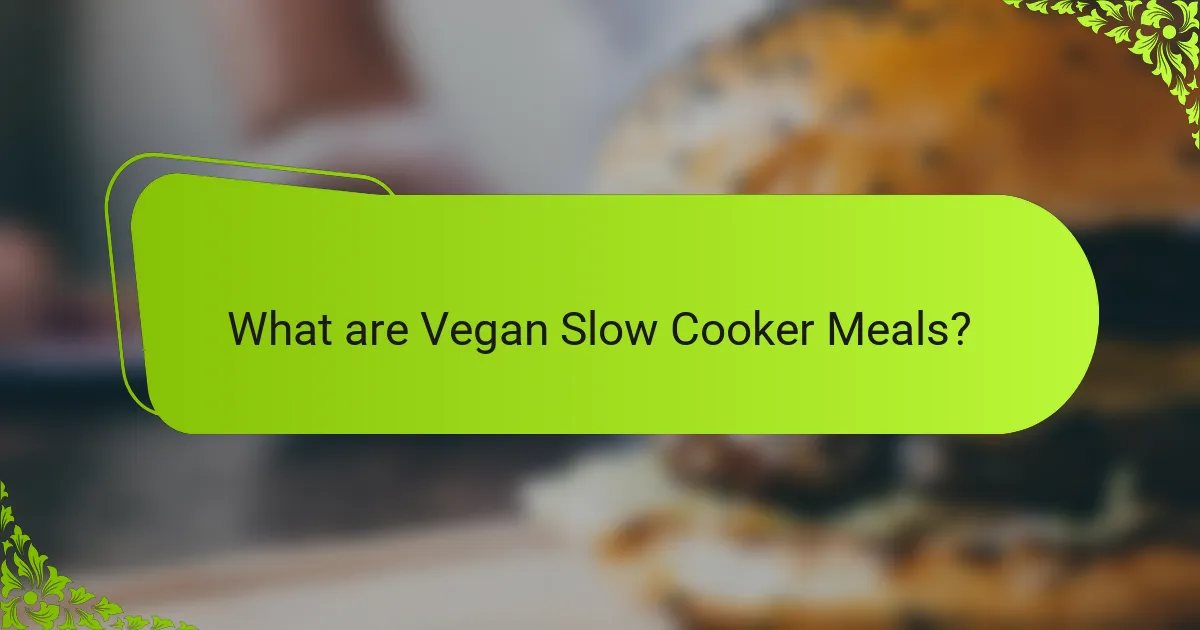
What are Vegan Slow Cooker Meals?
Vegan slow cooker meals are plant-based dishes prepared using a slow cooker. These meals typically consist of vegetables, grains, legumes, and spices. The slow cooking method allows flavors to meld over time. This technique also retains nutrients in the ingredients. Many vegan slow cooker recipes are easy to prepare. They often require minimal active cooking time. Studies show slow cooking can enhance the taste and texture of plant-based foods. This method is particularly beneficial for busy individuals seeking nutritious meals.
How do Vegan Slow Cooker Meals differ from traditional meals?
Vegan slow cooker meals differ from traditional meals primarily in their ingredient composition and nutritional profile. Traditional meals often include meat or animal products, while vegan meals exclusively use plant-based ingredients. This results in lower saturated fat content in vegan meals. Additionally, vegan slow cooker meals are rich in fiber due to the inclusion of legumes, grains, and vegetables. Studies show that plant-based diets can lower the risk of chronic diseases. Cooking times may also vary, as vegan ingredients can sometimes require less time to become tender. Overall, vegan slow cooker meals provide a healthier alternative with distinct nutritional benefits.
What ingredients are typically used in Vegan Slow Cooker Meals?
Vegan slow cooker meals typically use vegetables, legumes, grains, and plant-based proteins. Common vegetables include carrots, potatoes, and bell peppers. Legumes like lentils and chickpeas provide protein and fiber. Grains such as quinoa and brown rice are often included for bulk and nutrition. Plant-based proteins can include tofu or tempeh. Herbs and spices enhance flavor without animal products. Coconut milk or vegetable broth often serve as liquids for cooking. This combination creates nutritious and satisfying meals.
How do preparation methods vary for Vegan Slow Cooker Meals?
Vegan slow cooker meals can vary in preparation methods based on ingredients and desired outcomes. Some recipes require pre-soaking beans or grains to reduce cooking time. Others may involve sautéing vegetables or spices beforehand to enhance flavors.
Cooking times can differ significantly depending on the ingredients used. For instance, root vegetables may take longer to cook than leafy greens.
Additionally, layering ingredients can impact cooking efficiency. Placing denser items at the bottom allows for even cooking.
Different recipes may also suggest varying liquid amounts to achieve desired consistency. This can influence the final texture of the dish.
Overall, preparation methods for vegan slow cooker meals are adaptable to specific ingredients and personal preferences.
What are the benefits of using a slow cooker for vegan meals?
Using a slow cooker for vegan meals offers several benefits. Slow cookers enhance flavor by allowing ingredients to meld over time. This method also preserves nutrients, as cooking at low temperatures reduces nutrient loss. Additionally, slow cooking saves time, as meals can be prepared in advance and left to cook while you engage in other activities.
The convenience of a slow cooker allows for easy meal prep, requiring minimal hands-on time. Many recipes can be made in bulk, providing leftovers for future meals. Slow cooking can also make tough vegetables and legumes tender and flavorful. Overall, these advantages create a more enjoyable and efficient cooking experience for vegan meals.
How does slow cooking enhance the flavors of vegan ingredients?
Slow cooking enhances the flavors of vegan ingredients by allowing them to simmer in their natural juices. This method promotes the release of essential oils and compounds from herbs and spices. It also helps to soften the texture of vegetables, making them more palatable. The prolonged cooking time allows flavors to meld and deepen, resulting in a more complex taste. Studies show that slow cooking can increase the bioavailability of certain nutrients in plant-based foods. This technique also minimizes nutrient loss compared to high-heat cooking methods. Overall, slow cooking creates a rich, flavorful profile that highlights the essence of vegan ingredients.
What time-saving advantages do Vegan Slow Cooker Meals offer?
Vegan slow cooker meals offer significant time-saving advantages. They allow for meal preparation in advance. Ingredients can be chopped and added to the slow cooker in the morning. This process requires minimal active cooking time. Slow cookers operate unattended for several hours. This frees up time for other activities. Studies show that using a slow cooker can reduce meal prep time by up to 70%. The convenience of one-pot cooking minimizes cleanup. Overall, vegan slow cooker meals streamline the cooking process effectively.
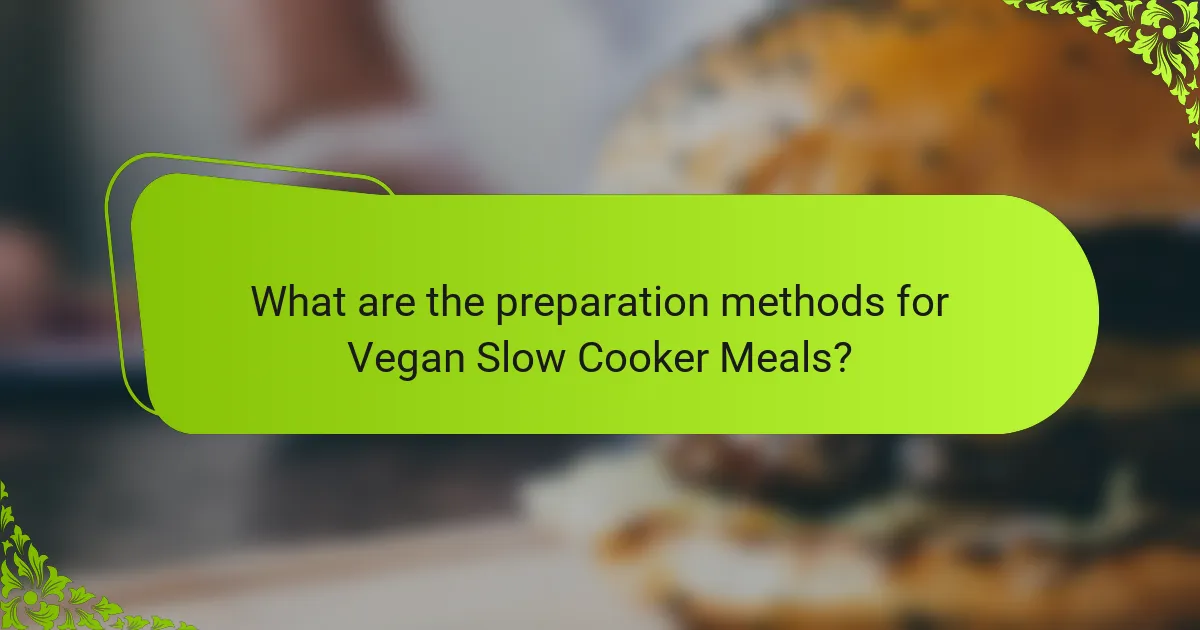
What are the preparation methods for Vegan Slow Cooker Meals?
Vegan slow cooker meals can be prepared using several methods. The primary methods include chopping ingredients, layering them in the slow cooker, and adding liquid. Ingredients are typically chopped into uniform sizes for even cooking. Layering helps to create distinct flavors and textures. Liquid, such as vegetable broth or water, is essential for proper cooking.
Another method involves pre-cooking certain items. This can enhance flavor and reduce cooking time. For instance, sautéing onions or garlic before adding them to the slow cooker can deepen their flavor.
Lastly, using a slow cooker liner can simplify cleanup. This method allows for easy removal of food and minimizes sticking. These preparation methods ensure that vegan slow cooker meals are flavorful and convenient.
How do you prepare ingredients for Vegan Slow Cooker Meals?
To prepare ingredients for vegan slow cooker meals, start by washing and chopping vegetables. Common choices include carrots, potatoes, and bell peppers. Next, measure out grains or legumes like quinoa or lentils. Rinse these thoroughly to remove any debris.
Then, combine all ingredients in the slow cooker. Layer denser items at the bottom for even cooking. Add spices and herbs to enhance flavor. Finally, pour in any necessary liquids, such as vegetable broth or water, to ensure proper cooking.
This method ensures even cooking and optimal flavor extraction.
What cutting techniques are best for vegetables in slow cooking?
The best cutting techniques for vegetables in slow cooking include chopping, dicing, and slicing. Chopping creates larger pieces that retain texture. Dicing results in uniform small cubes, promoting even cooking. Slicing offers thin pieces that cook quickly and blend flavors. These techniques ensure vegetables cook evenly and maintain their nutritional value. Consistent sizes help achieve optimal tenderness and flavor integration during the slow cooking process.
How should spices and herbs be incorporated into Vegan Slow Cooker Meals?
Spices and herbs should be added to vegan slow cooker meals at different stages for optimal flavor. Early in the cooking process, robust herbs like rosemary and thyme can infuse the dish. Delicate herbs such as basil and cilantro should be added closer to the end to preserve their flavor. Ground spices, like cumin and coriander, benefit from early addition, enhancing their depth. Whole spices, such as cinnamon sticks, can also be added early for a stronger essence. Adjusting the quantity based on the cooking time is essential; longer cooking times may require less spice. Research indicates that herbs and spices can enhance the nutritional profile of meals, providing antioxidants and anti-inflammatory properties.
What cooking methods can be used in a slow cooker?
Slow cookers primarily use three cooking methods: simmering, braising, and steaming. Simmering involves cooking food in liquid at low temperatures over extended periods. Braising combines both dry and moist heat, often starting with browning food before adding liquid. Steaming utilizes water vapor to cook food, preserving nutrients and flavor. These methods are effective for preparing vegan meals, ensuring tenderness and enhancing flavors. Studies show that slow cooking can retain more nutrients compared to other methods, making it a healthy option for plant-based diets.
What is the difference between low and high heat settings?
Low heat settings cook food slowly and gently, while high heat settings cook food more quickly and at a higher temperature. Low heat typically ranges from 190°F to 210°F, allowing flavors to meld and ingredients to soften over several hours. High heat usually ranges from 250°F to 300°F, enabling faster cooking times, often within a few hours. The choice between low and high heat affects texture and flavor development in dishes. For instance, stews benefit from low heat for tenderizing, while quick soups may be suited for high heat.
How does layering ingredients affect cooking outcomes?
Layering ingredients affects cooking outcomes by influencing heat distribution and flavor infusion. Proper layering ensures that denser ingredients, like root vegetables, are placed at the bottom. This allows them to cook evenly and absorb flavors from the broth and spices above. Conversely, delicate ingredients, such as leafy greens, should be placed on top to prevent overcooking. Research indicates that layering can also enhance nutrient retention by minimizing exposure to high temperatures. For example, a study published in the Journal of Food Science showed that layered cooking methods can preserve more vitamins compared to mixed cooking methods. Thus, effective layering in slow cooking optimizes both texture and nutritional value.
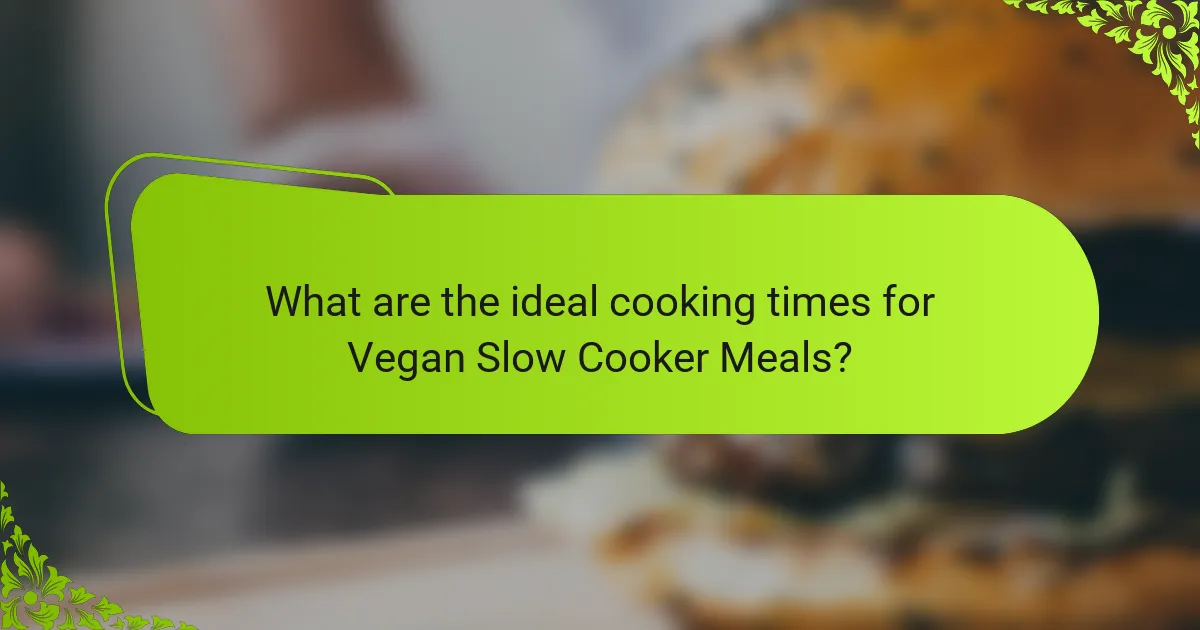
What are the ideal cooking times for Vegan Slow Cooker Meals?
The ideal cooking times for vegan slow cooker meals typically range from 4 to 8 hours on low heat. Cooking for 4 to 6 hours is suitable for softer vegetables and grains. For tougher vegetables and legumes, 6 to 8 hours is recommended. Cooking times may vary based on the specific ingredients used. For example, beans require longer cooking times compared to leafy greens. Slow cooking allows flavors to meld and enhances the meal’s overall taste. According to the USDA, slow cooking at low temperatures ensures food safety and optimal texture.
How long should different types of vegan ingredients be cooked?
Cooking times for different types of vegan ingredients vary significantly. Leafy greens should be cooked for 5 to 10 minutes. Root vegetables like carrots and potatoes typically require 20 to 30 minutes. Legumes, such as lentils and chickpeas, usually need 30 to 45 minutes. Whole grains, including quinoa and brown rice, often take 30 to 50 minutes. Tofu can be cooked in about 10 to 15 minutes when sautéed. Cooking times ensure ingredients are tender and flavors are well developed. Proper cooking enhances the nutritional profile of the ingredients.
What are the recommended cooking times for beans and legumes?
The recommended cooking times for beans and legumes vary based on the type. Generally, dried beans require 1 to 2 hours of cooking in a slow cooker. For lentils, the cooking time is typically 1 to 1.5 hours. Split peas usually take about 1 to 1.5 hours as well. Soaking beans overnight can reduce cooking time. Soaked beans may cook in 30 minutes to 1 hour. Cooking times can also vary based on the specific variety of beans or legumes. For example, black beans may take longer than pinto beans. Always check for tenderness to ensure they are fully cooked.
How do cooking times differ for root vegetables and grains?
Root vegetables generally require longer cooking times than grains. For example, root vegetables like carrots and potatoes typically take 30 to 60 minutes to cook in a slow cooker. In contrast, grains such as rice or quinoa usually cook in about 20 to 40 minutes. The denser structure of root vegetables contributes to their longer cooking duration. Grains absorb water and soften more quickly due to their smaller size and different composition. Cooking times can also vary based on the specific type of vegetable or grain used. For instance, brown rice takes longer than white rice, while sweet potatoes may cook faster than regular potatoes.
What factors influence cooking times in a slow cooker?
Cooking times in a slow cooker are influenced by several key factors. The size of the food being cooked affects the time required. Larger pieces of food take longer to cook than smaller ones. The type of ingredients also plays a role; denser vegetables and meats require more time than lighter items. The temperature setting chosen impacts the cooking duration as well. Higher settings will cook food faster than low settings. Additionally, the amount of liquid in the slow cooker can alter cooking times. More liquid can lead to longer cooking durations, while less liquid may speed up the process. Finally, the specific model of the slow cooker can vary in efficiency, which affects overall cooking times.
How does the size of the slow cooker impact cooking duration?
The size of the slow cooker directly influences cooking duration. Larger slow cookers can accommodate more food, which may require longer cooking times to ensure even heating. Conversely, smaller slow cookers generally heat food more quickly due to less volume. Cooking times can also vary based on the density and type of ingredients used. For instance, a full slow cooker may take 8 to 10 hours on low heat, while a partially filled one might only need 4 to 6 hours. This variance is crucial for achieving optimal texture and flavor in vegan meals.
What role does the temperature setting play in cooking times?
The temperature setting significantly influences cooking times. Higher temperature settings reduce the time needed for food to cook. Conversely, lower settings extend the cooking duration. For example, cooking on high may take 4-6 hours, while low settings can require 8-10 hours. This variation is due to the heat intensity affecting the rate of food breakdown. Ingredients cook at different rates, and temperature affects moisture retention and flavor development. Adjusting the temperature can also impact the texture of the food, making it either tender or overcooked. Hence, understanding temperature settings is essential for optimal cooking results.
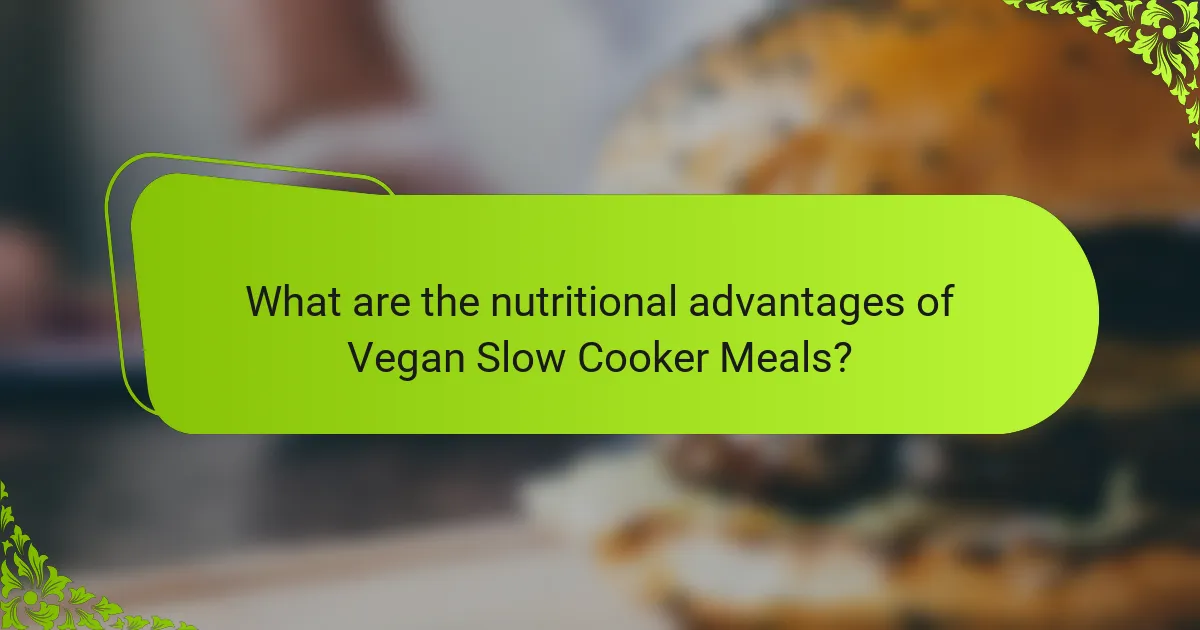
What are the nutritional advantages of Vegan Slow Cooker Meals?
Vegan slow cooker meals offer numerous nutritional advantages. They are often rich in plant-based nutrients, including vitamins, minerals, and antioxidants. Slow cooking helps retain the nutritional integrity of ingredients. This method also allows for the use of whole foods, such as legumes, grains, and vegetables. These foods provide essential fiber, which aids digestion and promotes heart health.
Moreover, vegan meals typically contain lower saturated fats compared to animal-based dishes. Research indicates that a plant-based diet can reduce the risk of chronic diseases. For instance, a study published in the Journal of the American Heart Association found that plant-based diets lower heart disease risk by 40%.
Additionally, slow cooking enhances flavors without the need for added fats or sugars. This method can lead to healthier meal options that are satisfying and flavorful. Overall, vegan slow cooker meals combine convenience with significant health benefits.
How do Vegan Slow Cooker Meals contribute to a balanced diet?
Vegan slow cooker meals contribute to a balanced diet by providing essential nutrients while minimizing unhealthy fats. They typically include a variety of vegetables, legumes, and whole grains. These ingredients are rich in vitamins, minerals, and fiber. Fiber aids digestion and helps maintain a healthy weight. The slow cooking process retains nutrients and enhances flavors without the need for added sugars or unhealthy oils. Studies show that plant-based diets can reduce the risk of chronic diseases. For example, a study published in the Journal of Nutrition found that plant-based diets are associated with lower cholesterol levels. Therefore, incorporating vegan slow cooker meals supports overall health and well-being.
What essential nutrients are commonly found in these meals?
Vegan slow cooker meals commonly contain essential nutrients such as protein, fiber, vitamins, and minerals. These meals often include legumes, grains, and vegetables. Legumes like lentils and chickpeas provide high-quality protein and fiber. Whole grains such as quinoa and brown rice contribute additional protein and essential amino acids. Vegetables are rich in vitamins A, C, and K, along with important minerals like potassium and magnesium. The slow cooking process helps retain these nutrients, making them more bioavailable. Research indicates that cooking methods can affect nutrient retention, with slow cooking preserving more vitamins compared to high-heat methods.
How can Vegan Slow Cooker Meals support weight management?
Vegan slow cooker meals support weight management by promoting lower calorie intake and higher nutrient density. These meals typically include whole plant foods, which are rich in fiber. Fiber increases satiety, helping individuals feel fuller for longer. Additionally, the slow cooking method preserves nutrients and enhances flavor without added fats. Research shows that diets high in fruits and vegetables can lead to weight loss and better health outcomes. A study published in the Journal of Nutrition found that higher vegetable intake is associated with lower body weight. Therefore, incorporating vegan slow cooker meals can be an effective strategy for those aiming to manage their weight.
What health benefits are associated with consuming vegan meals?
Consuming vegan meals offers several health benefits. These meals are typically lower in saturated fat. This can lead to improved heart health. Vegan diets are rich in fruits, vegetables, and whole grains. This promotes better digestion and nutrient absorption. Studies show that vegans tend to have lower body mass indexes (BMIs). A lower BMI is associated with reduced risk of chronic diseases. Additionally, vegan diets are linked to lower cholesterol levels. This further supports cardiovascular health.
How do plant-based ingredients promote heart health?
Plant-based ingredients promote heart health by providing essential nutrients and reducing harmful substances. They are rich in fiber, which helps lower cholesterol levels. High fiber intake is linked to a 25% reduction in heart disease risk. Plant-based foods also contain antioxidants, which combat oxidative stress and inflammation. Foods like fruits, vegetables, and whole grains have been shown to improve blood pressure. A study published in the Journal of the American College of Cardiology found that a plant-based diet can reduce the risk of heart disease by 40%. Additionally, plant-based diets are typically lower in saturated fats, contributing to better heart health.
What impact do Vegan Slow Cooker Meals have on digestion?
Vegan slow cooker meals positively impact digestion. These meals are typically high in fiber due to the inclusion of vegetables, legumes, and whole grains. Fiber aids in promoting regular bowel movements and preventing constipation. Additionally, the slow cooking process can enhance nutrient absorption. Cooking at lower temperatures helps retain vitamins and minerals. The gentle cooking method also makes food easier to digest. Ingredients in vegan meals, like beans and lentils, provide prebiotic fibers that support gut health. Studies show that a high-fiber diet can lead to improved digestive health and a balanced gut microbiome.
What tips can enhance the experience of making Vegan Slow Cooker Meals?
To enhance the experience of making Vegan Slow Cooker Meals, use fresh, high-quality ingredients. Fresh vegetables and herbs significantly improve flavor and nutrition. Prepare ingredients ahead of time to streamline the cooking process. This reduces stress and saves time on cooking day. Layer ingredients properly in the slow cooker. Place sturdier items like root vegetables at the bottom. This ensures even cooking. Adjust cooking times based on the recipe and ingredients. Different vegetables have varying cooking times. Avoid lifting the lid during cooking. Each time the lid is lifted, heat escapes and extends cooking time. Experiment with spices and herbs for added flavor. This can transform a simple dish into a gourmet experience. Lastly, let the meal cool completely before storing leftovers. This prevents bacterial growth and maintains food quality.
Vegan slow cooker meals are plant-based dishes prepared using a slow cooker, primarily consisting of vegetables, grains, legumes, and spices. This cooking method enhances flavors, retains nutrients, and provides a convenient option for busy individuals seeking nutritious meals. The article covers the differences between vegan slow cooker meals and traditional meals, typical ingredients used, various preparation methods, and the time-saving advantages of slow cooking. Additionally, it explores the nutritional benefits of these meals, including their role in weight management and heart health, along with tips for enhancing the cooking experience.
